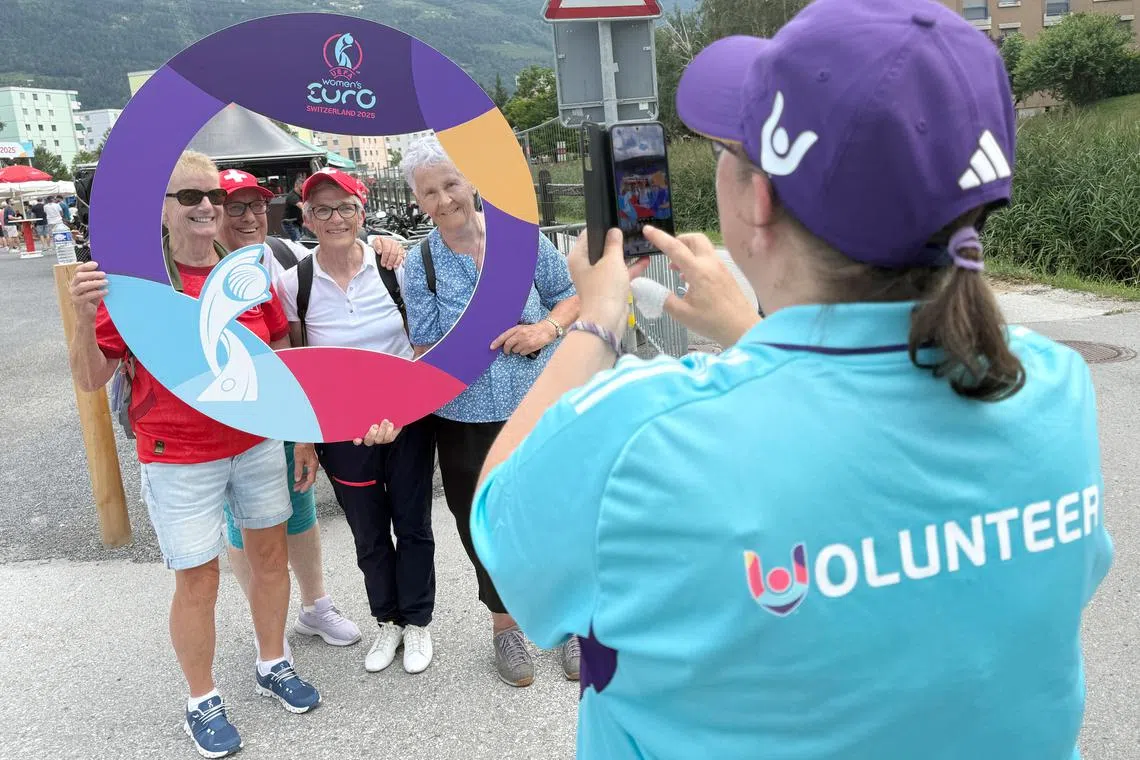A beautiful gift: Swiss women pioneers celebrate football’s transformation
Sign up now: Get ST's newsletters delivered to your inbox

Former Swiss national team players Cathy Moser, Nelly Juillard, Rosemarie Siggen and Elisabeth Copt pose for a photo.
PHOTO: REUTERS
Follow topic:
SION – On a restaurant terrace in the Swiss city of Sion, a group of women’s football pioneers gather – veterans who have watched the beautiful game transform beyond recognition in Switzerland.
For 72-year-old Madeleine Boll, it is a proud moment to see the city in French-speaking Switzerland hosting three games in the Women’s European Championship that is being staged across the country.
The tournament mascot – a St Bernard puppy called Maddli – takes its name from her, honouring her role in advancing women’s football in Switzerland.
At 12 years old in 1965, Boll broke new ground by becoming the first woman in Switzerland to obtain a football licence, which allowed her to play for FC Sion’s boys’ youth team.
But just months later it was taken away from her after the club said it had made an error.
“I was the happiest little girl. But the day they took away my licence, I was the unhappiest because I didn’t understand why I was forbidden to play,” Boll told Reuters.
However, it marked the first in a series of landmark moments that enabled women's inclusion in Swiss football.
By 1970, Switzerland had established its first Women’s Football League, with Jean Boll – Madeleine’s father – serving as president. Madeleine subsequently played for FC Sion, one of the country’s pioneering women’s football clubs.
“It’s a beautiful gift because it’s here that the beginnings of Swiss women’s football took root,” she said.
A lot has changed since Boll and her generation played. There are now 40,000 registered women players and 134 female referees in Switzerland, according to the Swiss FA. “It was different. We didn’t have jerseys, we didn’t have means to travel... We had to make people understand that we are capable of playing,” said 72-year-old Rose-Marie Siggen from Sion, who started playing football towards the end of the 1960s.
For Siggen and Boll, who were joined by four other footballing pioneers in the women’s game in Sion, the 2025 tournament is a key moment to make strides in supporting women’s football. “The Euros will be a catalyst,” Boll said, pointing to it as an opportunity for greater investment in the women’s game.
The Swiss hosts are hoping the legacy of the tournament – being played across eight cities over the next month – will bolster female football in the country as Euro 2022 did for champions England.
It is aiming to double the number of female players by 2027, according to the Swiss FA. “It’s a bit difficult for these young girls. They need help. I think there should be stronger support, a real investment... we want to see them progress because they can bring many beautiful things,” said Siggen.
Boll also hopes that the Switzerland side, who lost their first match of the tournament 2-1 to Norway, can continue to make strides with more financial support. “If we want to have a good Swiss team... it will be important that girls become professional because it is difficult to achieve results while having a job or being a student,” she said.
Uefa, the governing body for European football, announced a record 600,000 tickets have been sold for the tournament. Basel will host the final on July 27 at St Jakob-Park, the largest football stadium in Switzerland.
Meanwhile, the team will aim to bounce back as they take on Iceland in their second match on July 6, hoping that home advantage can play a part.
Forward Iman Beney said: “It was a beautiful day (the opening match against Norway).
“Two years ago, some of us played in the U-17 Euro together. It’s incredible that two years later we can say we’ve played at a home Euro in front of so many people. The emotion in the stadium – it was just incredible, with all of these fans.” REUTERS

